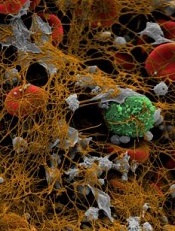
Credit: Andre E.X. Brown
The European Medicines Agency’s Committee for Medicinal Products for Human Use (CHMP) has recommended that apixaban (Eliquis) be granted marketing authorization for the treatment and prevention of venous thromboembolism (VTE) in adults.
The European Commission will take the CHMP’s opinion into account when deciding whether to approve the drug for this indication in all 28 European Union member states, plus Iceland and Norway.
The CHMP’s recommendation of apixaban was based on results from the AMPLIFY and AMPLIFY-EXTENSION studies.
The phase 3 AMPLIFY trial enrolled 5395 patients with confirmed, symptomatic deep vein thrombosis (DVT) or pulmonary embolism (PE) requiring treatment for 6 months.
About half of patients (n=2691) were randomized to apixaban, and the other half (n=2704) were randomized to standard of care, which was initial enoxaparin treatment overlapped by warfarin therapy.
The primary efficacy outcome was the composite endpoint of recurrent, symptomatic VTE or VTE-related death. This occurred in 59 patients in the apixaban arm (2.3%) and 71 patients (2.7%) in the standard-therapy arm (P<0.0001 for noninferiority).
The composite endpoint of major bleeding and clinically relevant, nonmajor bleeding occurred in 4.3% of patients in the apixaban arm and 9.7% of patients in the standard-therapy arm (P<0.001).
The phase 3 AMPLIFY-EXTENSION trial included 2486 patients with prior VTE who had completed 6 to 12 months of anticoagulation treatment for DVT or PE.
Eight hundred and forty-two patients were randomized to apixaban at 2.5 mg, 815 were randomized to apixaban at 5 mg, and 829 were randomized to placebo.
The study’s primary efficacy endpoint was recurrent VTE or all-cause death. During the 12-month active study period, these events occurred in 32 patients (3.8%) in the 2.5-mg arm, 34 patients (4.2%) in the 5-mg arm, and 96 patients (11.6%) in the placebo arm. Both apixaban doses were significantly superior to placebo (P<0.001).
The primary safety endpoint was the incidence of major bleeding, which occurred in 2 patients (0.2%) in the 2.5-mg arm, 1 patient (0.1%) in the 5-mg arm, and 4 patients (0.5%) in the placebo arm.

